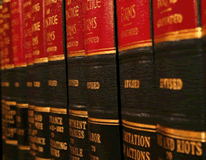“The Case of the Speluncean Explorers" -- The Classic Law Review Article Revisited - Podcast
Professional Responsibility & Legal Education Practice Group Pocast
| Sponsors: | Professional Responsibility & Legal Education Practice Group |
|---|
 It is the year 4300 in an imaginary jurisdiction named Newgarth. Old questions dominate the deliberations of the Supreme Court as Chief Justice Truepenny and his four colleagues present their opinions in the appeal of a notorious murder verdict. Each Justice presents and defends his analysis and disposition of the appeal. The opinions offer considered views of law, justice, judges' work and larger public opinion. No pale pastels for the Truepenny Court, as its members alternately resort to the broad brush and the fine scalpel. The final effect is one of a well written teaching tool and also an essay on our flawed human condition.
It is the year 4300 in an imaginary jurisdiction named Newgarth. Old questions dominate the deliberations of the Supreme Court as Chief Justice Truepenny and his four colleagues present their opinions in the appeal of a notorious murder verdict. Each Justice presents and defends his analysis and disposition of the appeal. The opinions offer considered views of law, justice, judges' work and larger public opinion. No pale pastels for the Truepenny Court, as its members alternately resort to the broad brush and the fine scalpel. The final effect is one of a well written teaching tool and also an essay on our flawed human condition.
Prof. Lon L. Fuller, in his article, “The Case of the Speluncean Explorers,” presented his ideas in the form of a dialogue, without footnotes. The Harvard Law Review published it in February 1949. In a sense it is a work of moral imagination. In another sense it is so dated as to be almost antiquarian. The members of Supreme Court of Newgarth are male and the legal analysis they offer and the language they use are distinctly old-fashioned. In some quarters it would be regarded as a discredited tool of oppression. That said, Prof. Fuller still entertains and teaches the reader, 65 years later. The questions and worries that lawyers and judges share with the Justices of Newgarth still loom in the 21st century.
Our discussion panel was composed of legal scholars from Canada, Australia, and the United States. In a real sense, its diversity shows the continuing relevance and appeal of this legal classic. This podcast is a installment of the Legal Classics Revisited Teleforum Series.
- Prof. James Allan, Garrick Professor of Law, University of Queensland, TC Beirne School of Law
- James A. Haynes, Attorney and Alternate Judge, U.S. Department of Labor, Employees Compensation Appeals Board
- Prof. Dan Priel, York University Osgoode School of Law
- Prof. Frederick Schauer, David and Mary Harrison Distinguished Professor of Law, University of Virginia School of Law





